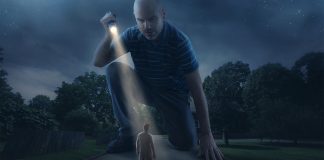The great astonishment
I was talking to the man I call Professor and I asked him, "I know you had reservations about getting baptised. Why did you decide to do it anyway? What was the deciding factor?"
“God is dead”. Any objections?
The tendency toward the total privatization of religious life is particularly strong today, especially in the new generation.
Intercessory prayer
What do Protestants have against the intercession of saints? If, during their lives on earth, the saints interceded with God for their fellow men, after they’ve gone to heaven would they be wrapped in holy indifference? Or would their intercession continue?
What is the purpose for which God created us?
Life is a fascinating mystery and a constant challenge. Yet, often, we are not content with merely experiencing life as it is.
Conspiracy: from Lord of the Rings to the era of fake news
Towards the end of the Lord of the Rings trilogy, there is a final showdown between Frodo and Smeagol. Smeagol tries to regain possession of "My Precious", and when Frodo resists, Smeagol tries to strangle him. One scene in this part shows Frodo shocked that Smeagol has broken his promise and, though on the brink of death, sees fit to plead for honour:...
Self-help and spiritual paralysis
Why personalising Christianity could threaten your salvation.
Messages from above
One day, Jesus’s disciples—who followed Him about, observing His every word and action—asked Him to teach them how to pray.
Confronting deception: from Jesus to the Internet
Let's go back in time to the day when Jesus spoke His apocalyptic words. At that time, rather than giving a revelation about the future, He was more concerned with warning about the dangers of deception.
We are more than we can easily explain
Suppose I leave the window open then leave home. A stack of banknotes can be seen on the table through the open window. An individual walking down the street notices the opportunity, thinks for a while, but decides to move on. Why would a man who has the opportunity to steal decide not to?
Cringeworthy!
When a visitor walks into your church, what will they see? What will they hear? How will they feel?
Reacting to the worst news
In a conversation with Dr. Shelly-Ann Bowen, we discussed her research on what determines whether someone will be active or passive in the face of catastrophic events—fires, floods, or a cancer diagnosis. Social injustice, a lack of self-awareness, and even an immature understanding of faith paralyse action. But there are ways to make positive changes.
Jesus also loved…
"History shows how surpassingly difficult it is for Christians not to forget Christ," says Professor Chris Green. Forgetting does not mean losing sight of His existence, but rather losing sight of His way of being, His values, and His way of relating to those around Him.
Moesha Johnson’s Olympic miracle
In the choppy waters of Port Doha, Qatar, things weren’t looking good. Moesha was midway through a 10-kilometre open water race in the World Championships. This was her chance to qualify for the Olympics. But she was trailing behind a pack of thirty girls and had been for much of the race.
A day on the golf course and the unexpected effects of trauma
Douglas Jacobs has a long pastoral and academic career, as well as many hobbies and interests. An accidental witness to an armed incident that changed his perspective on life and death, he shares his surprising experiences and lessons learned.
The testament of Jesus
We experience a feeling of urgency as a consequence of the fear of failure, or the fear of missing out (on people, opportunities, time, good things). Urgency is, therefore, a corollary of fear. Today’s Christianity, hailed by loud voices as near extinction, can easily fall into the trap of undue urgency to quickly regain what has been lost.


























